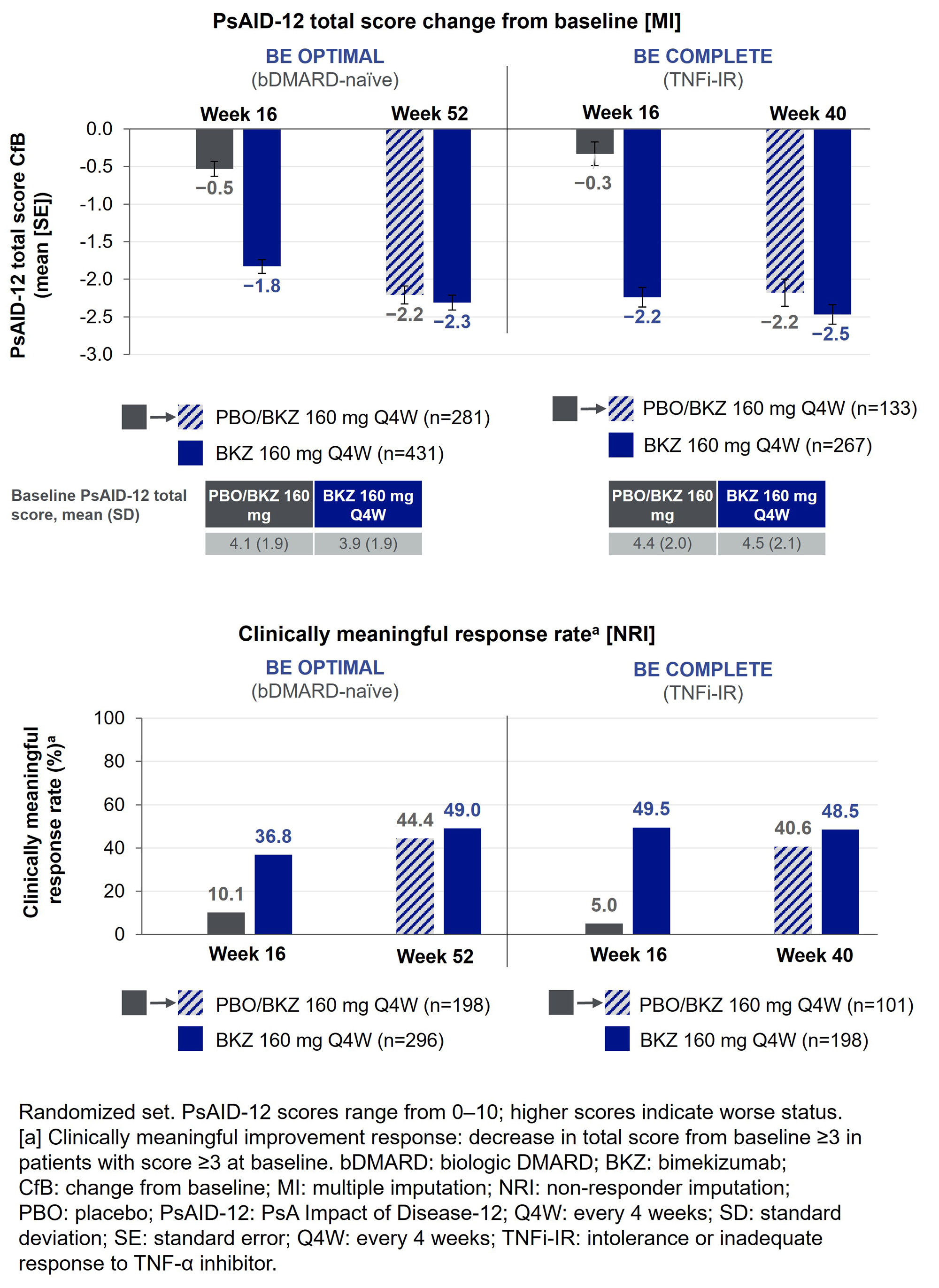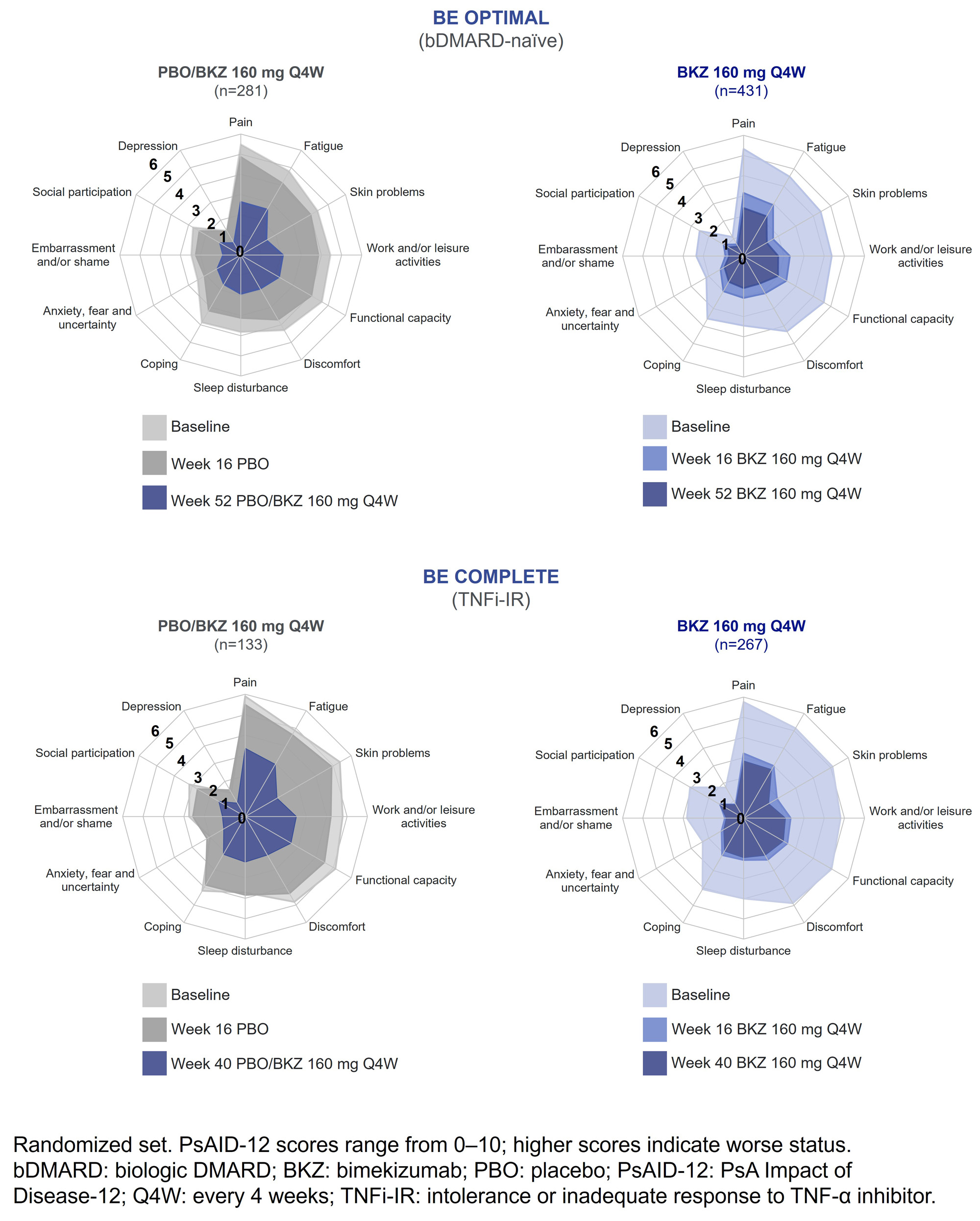Session Information
Date: Tuesday, November 14, 2023
Title: (2227–2256) Spondyloarthritis Including Psoriatic Arthritis – Treatment: SpA Poster III
Session Type: Poster Session C
Session Time: 9:00AM-11:00AM
Background/Purpose: The PsA Impact of Disease‑12 (PsAID‑12) questionnaire is a patient (pt)-reported outcome measure assessing the impact of PsA on 12 physical, social, and psychological domains. OMERACT provisionally endorsed PsAID-12 as a core outcome measure for health-related quality of life (HRQoL) in clinical trials.1 Bimekizumab (BKZ), a monoclonal IgG1 antibody that selectively inhibits IL‑17F in addition to IL‑17A, has demonstrated efficacy and tolerability to 52 weeks (wks) in pts with active PsA.2,3 Here, the impact of BKZ on pt-reported symptoms and HRQoL, assessed by PsAID-12, is reported to 1 year.
Methods: The phase 3 BE OPTIMAL (NCT03895203) and BE COMPLETE (NCT03896581) trials, both with a 16-wk double-blind, placebo (PBO)-controlled phase, assessed BKZ in pts with PsA who were biologic DMARD (bDMARD)-naïve or had intolerance or inadequate response to 1–2 TNF-α inhibitors (TNFi-IR), respectively. Pts in BE OPTIMAL were randomized 3:2:1 to subcutaneous (sc) BKZ 160 mg every 4 wks (Q4W), PBO, or reference (sc adalimumab 40 mg Q2W; data not reported here). At Wk 16, PBO pts switched to receive BKZ (PBO/BKZ). Pts in BE COMPLETE were randomized 2:1 to sc BKZ 160 mg Q4W or PBO; Wk 16 completers were eligible to enter an open‑label extension, BE VITAL (NCT04009499), when PBO pts switched to BKZ (PBO/BKZ). BE COMPLETE plus BE VITAL is referred to as ‘BE COMPLETE’ hereafter. PsAID‑12 total and single-item domain scores range from 0–10; higher scores indicate worse status.1 Change from baseline (BL; CfB) and clinically meaningful improvement responses (decrease ≥3 from BL when respective PsAID‑12 score ≥3 at BL) were collected to Wk 52 in BE OPTIMAL and Wk 40 in BE COMPLETE. Missing data imputed using multiple imputation (MI; continuous) or non‑responder imputation (NRI; binary).
Results: 770/852 (90.4%) and 347/400 (86.8%) pts completed Wk 52 of BE OPTIMAL and BE COMPLETE, respectively. BKZ pts showed sustained improvements in PsAID-12 total score, with a mean CfB of –1.8 at Wk 16 and –2.3 at Wk 52 in BE OPTIMAL and –2.2 at Wk 16 and –2.5 at Wk 40 in BE COMPLETE. In both trials, PBO/BKZ pts achieved similar improvements to BKZ pts at Wk 52/40 (Figure 1). Clinically meaningful improvement response in PsAID-12 total score was achieved by 44.4% PBO/BKZ and 49.0% BKZ pts at Wk 52 in BE OPTIMAL, and 40.6% PBO/BKZ and 48.5% BKZ pts at Wk 40 in BE COMPLETE (Figure1). In both trials, improvements from BL in PsAID-12 individual domain mean scores were observed across all domains at Wk 16 and sustained to Wk 52/40 on BKZ (Figure 2). The greatest improvements were observed in domains with the highest PsA impact at BL: pain, functional capacity, fatigue, and skin problems. Clinically meaningful improvement responses were achieved by around half of BKZ-treated patients across most individual domains, including pain, functional capacity, fatigue, and skin problems, at Wk 52/40.
Conclusion: Improvements in PsAID-12 total and most single-item domain scores at Wk 16 were sustained up to 1 year of BKZ treatment. Results were similar between the two trials, demonstrating consistent responses in bDMARD-naïve and TNFi‑IR pts with active PsA.
References:1. Orbai AM. J Rheumatol 2019;46:990–5. 2. Ritchlin CT. Arthritis Rheumatol. 2022;74 (S9); 3. Coates L. EULAR 2023;82 (S1).
To cite this abstract in AMA style:
Gladman D, Coates L, de Wit M, Ogdie A, Orbai A, Ink B, Taieb V, Lambert J, Gossec L. Bimekizumab-Treated Patients with Active PsA Showed Sustained Improvement in Disease Symptoms Assessed by the PsA Impact of Disease (PsAID)-12 Questionnaire: 1-Year Results Reported from Two Phase 3 Studies [abstract]. Arthritis Rheumatol. 2023; 75 (suppl 9). https://acrabstracts.org/abstract/bimekizumab-treated-patients-with-active-psa-showed-sustained-improvement-in-disease-symptoms-assessed-by-the-psa-impact-of-disease-psaid-12-questionnaire-1-year-results-reported-from-two-phase-3-s/. Accessed .« Back to ACR Convergence 2023
ACR Meeting Abstracts - https://acrabstracts.org/abstract/bimekizumab-treated-patients-with-active-psa-showed-sustained-improvement-in-disease-symptoms-assessed-by-the-psa-impact-of-disease-psaid-12-questionnaire-1-year-results-reported-from-two-phase-3-s/


